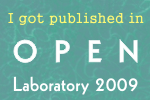(New: the paper was recently published in Genome Biology!) Long time readers of this blog (hi mom!) know that I am working with many other people in an effort called CAFA: the Critical Assessment of protein Function Annotation. This is a challenge that many research groups participate in, and its goal is to determine how […]
Or: “Estimating how much we don’t know, and how much it can hurt us”. This post is about a paper I published recently with Predrag Radivojac’s group at Indiana University, who lead the study. One of the main activities I’m involved with is CAFA,* the critical assessment of function annotations. The general idea of CAFA […]
Announcing CAFA 2: The Second Critical Assessment of protein Function Annotations Friends and Colleagues, We are pleased to announce the Second Critical Assessment of protein Function Annotation (CAFA) challenge. In CAFA 2, we would like to evaluate the performance of protein function prediction tools/methods (in old and new scenarios) and also expand the challenge to […]
From the organizers of CAGI 2013. I have been to the Critical Assessment in 2010 and 2011, and even participated as an assessor. It’s a fun meeting, and if your work involves prediction of phenotypes from genotypes, there is still time (just about) to accept some of the challenges. The Critical Assessment of Genome Interpretation […]
The Genome Center at University of California Davis and researchers at UC Santa Cruz are organizing a genome assembly competition which they call The Assemblathon. They have released two simulated genomes for competing groups to assemble as best they can. Assemblies are due February 6th, 2011. So there is still time, if you would like […]
cag·ey /ˈkājē/ (adjective) Reluctant to give information owing to caution or suspicion CAGI /ˈkājē/ (acronym) Critical Assessment of Genomic Interpretations. For details keep reading. The ability to sequence one’s genome adds a new dimension to the ancient maxim “know thyself”. What could be more revealing of one’s self than one’s own blueprint, explaining existing […]





